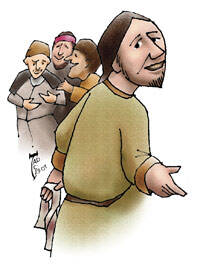Saving Gratitude
One of our sisters, as she approached her golden jubilee, was repeatedly heard to say, “I have all I need.” She had always lived very simply, and her stance of radical gratitude was infectious as she invited all whom she encountered to join her in this thankful space.
The first reading and the Gospel today tell stories of two different men afflicted with leprosy. One was a mighty warrior, commander of the army of the king of Aram. The other is huddled with a pitiful group of nine others likewise afflicted. The first, called Naaman, has easy access to the king. The one in the Gospel is nameless and is ostracized by all, keeping his distance even from Jesus. Both are foreigners who nonetheless are healed by Israel’s prophets, Elisha and Jesus. Both praise the God of Israel for their transformation.
In the Gospel account, the focus is on the way the one healed man turns around and loudly glorifies God, falling at Jesus’ feet, thanking him. It is a dramatic enactment of the stance of saving gratitude that divine gifts evoke. Jesus affirms the man’s response and tells him to go, that his faith has saved him. Luke does not elaborate what was the man’s inner disposition before he was healed. Was he filled with self-pity? Was he consumed with longing for well-being? Was he bitter or despairing over his deteriorating physical state?
At the realization of his healing, the man turned around, perhaps not only physically, but interiorly as well. When he lets gratitude for all God has given him consume him, he turns around from any other ailments that eat at his spirit. Jesus affirms that this kind of faith, rooted in thankfulness, is the healing, saving power (the Greek verb sozein connotes both “heal” and “save”) that enables him to go forward as a changed person, both in body and spirit.
In the first reading, Naaman has a much more difficult time accepting the full transformation offered him. In the verses leading up to today’s Lectionary selection, Naaman takes huge amounts of silver, gold and clothing, along with a letter from his king, when he approaches the king of Israel to ask for healing from the foreign prophet. He then goes to Elisha’s house with horses, chariots and all his retinue.
Elisha sends out a messenger, who directs Naaman to wash seven times in the Jordan River. Naaman is furious, declaring, “I thought for me he would surely come out, and stand and call on the name of the Lord, his God, and would wave his hand over the spot and cure the leprosy!” (1 Kgs 5:11).
Because of his high position, Naaman feels entitled to special, personal attention. He is used to giving commands and has a fixed idea of how the healing should be done. And although he has crossed over into Israelite territory, he has no regard for its life-giving water. He insists that the rivers in his own land are better than the Jordan. After he departs in a rage, his servants persuade him to go back and immerse himself in the Jordan.
Naaman struggles mightily to turn away from his stance of entitlement, from his attempts to buy healing and to direct the manner in which it should occur. After his healing, Naaman still tries to pay for it, but Elisha will take nothing from him. All that God or Jesus desires in return is a heart shaped by saving gratitude for freely given grace that has the power to heal both the inner and outer self.
This article also appeared in print, under the headline “Saving Gratitude,” in the October 4, 2010, issue.








